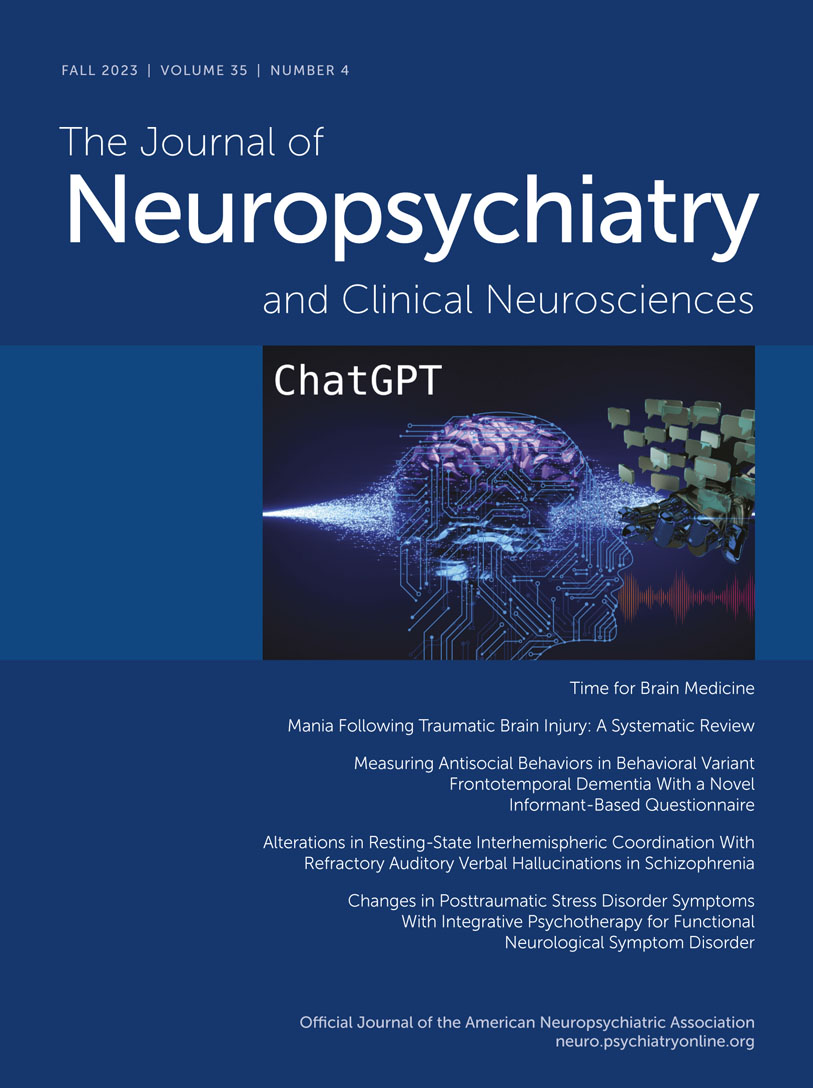Introducing JNCN Editor’s Choice: Curated Collections From The Journal of Neuropsychiatry and Clinical Neurosciences
In concert with this issue of The Journal of Neuropsychiatry and Clinical Neurosciences (JNCN) and in partnership with the American Neuropsychiatric Association (ANPA), for which JNCN is the official journal, our editorial team presents JNCN Editor’s Choice, curated collections for review and consideration by our readers and others. The articles in these collections include influential scholarly works published in JNCN addressing issues relevant to neuropsychiatric practice, training and professional development, and research. Each collection is assembled in partnership between JNCN’s editor and ANPA subject matter experts, committee chairs, or special interest group (SIG) leaders with the aim of helping clinicians, scientists, and educators revisit JNCN content relevant to their work.
The first installment of JNCN Editor’s Choice features the collected works of the ANPA Committee on Research (CoR). Established in 1993 and led by C. Edward Coffey, M.D., the ANPA CoR was charged by the association’s leaders with developing and leading a research mission and vision for the association (1). As its first project, the committee conducted a survey of ANPA members and British Neuropsychiatric Association members on the use of formal clinical outcome measures among neuropsychiatrists. The committee’s findings were published in JNCN in 1995 as the first report from the ANPA CoR (2).
Over the following three decades, the ANPA CoR expanded its aims to advance medical knowledge and clinical practice in the transdisciplinary area that is neuropsychiatry. Supported by luminaries in the field and leaders in ANPA, the ANPA CoR—drawing on its international cadre of clinician-scientists in behavioral neurology & neuropsychiatry, neuropsychology, and allied disciplines in the clinical neurosciences—developed scholarly works on issues of scientific and clinical importance to our field. The result is more than two dozen narrative reviews, systematic reviews, expert opinions, and clinical recommendation reports. In total, the articles in this collection have been cited more than 2,000 times, with an average of more than 80 citations per article, and they are among the most frequently cited articles published in JNCN (as reported in Web of Science Core Collection, Clarivate Analytics, 2023) (3–7). All of the articles align with the shared aims of ANPA and JNCN to advance neuropsychiatric practice, training, and research and to improve the lives of persons with disorders at the interface of psychiatry and neurology (https://www.anpaonline.org/About-Us).
Selma Aybek, M.D., and Mandana Modirrousta, M.D., Ph.D., the current ANPA CoR Chair and Vice Chair, respectively, partnered with me to assemble this collection and to showcase the contributions of the ANPA CoR to JNCN and to the field of neuropsychiatry since its inception. For the benefit of JNCN and its readers and ANPA and its members, this collection offers 30 years of scholarship by the ANPA CoR. Under the leadership of Drs. Aybek and Modirrousta, this committee will continue to serve and shape our field.
In the coming year and beyond, additional Editor’s Choice collections will be developed by ANPA SIGs and will address core topics in neuropsychiatry, including traumatic brain injury, neurodegenerative disorders, epilepsy, catatonia, functional neurological disorder, and forensic neuropsychiatry, among others. We hope that our readers, ANPA’s members, and others in the field will find these collections of interest and of use in their work as neuropsychiatric clinicians, educators, and scientists.
1. : The American Neuropsychiatric Association: ten years of progress and a future of great promise. J Neuropsychiatry Clin Neurosci 1999; 11:8–18Link, Google Scholar
2. : Assessment of treatment outcomes in neuropsychiatry: a report from the Committee on Research of the American Neuropsychiatric Association. J Neuropsychiatry Clin Neurosci 1995; 7:287–289Link, Google Scholar
3. : Executive control function: a review of its promise and challenges for clinical research: a report from the Committee on Research of the American Neuropsychiatric Association. J Neuropsychiatry Clin Neurosci 2002; 14:377–405Link, Google Scholar
4. : The cognitive correlates of functional status: a review from the Committee on Research of the American Neuropsychiatric Association. J Neuropsychiatry Clin Neurosci 2007; 19:249–265Link, Google Scholar
5. : Anti-N-methyl-d-aspartate receptor encephalitis: a review of psychiatric phenotypes and management considerations: a report of the American Neuropsychiatric Association Committee on Research. J Neuropsychiatry Clin Neurosci 2019; 31:137–142Link, Google Scholar
6. : Neuropsychiatry’s role in the postacute sequelae of COVID-19: report from the American Neuropsychiatric Association Committee on Research. J Neuropsychiatry Clin Neurosci 2022; 34:341–350Link, Google Scholar
7. : A review and expert opinion on the neuropsychiatric assessment of motor functional neurological disorders. J Neuropsychiatry Clin Neurosci 2021; 33:14–26Link, Google Scholar



